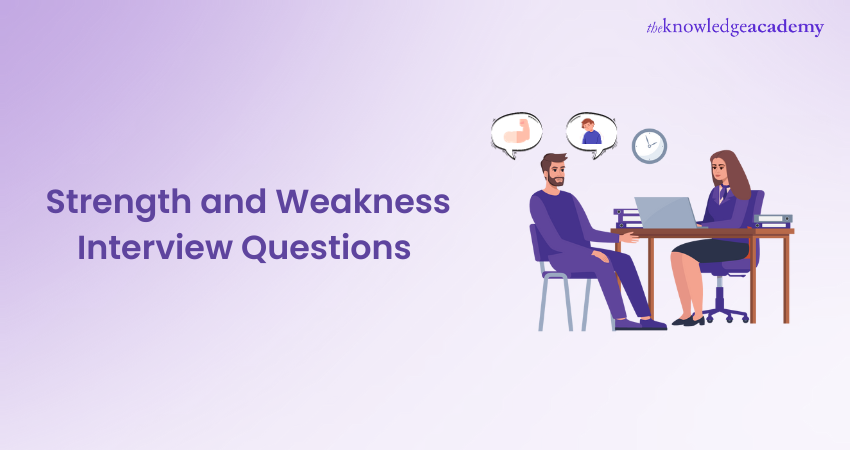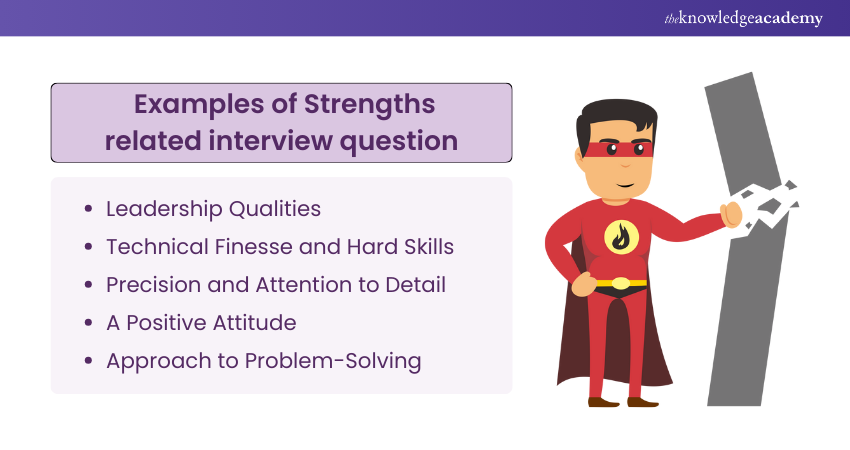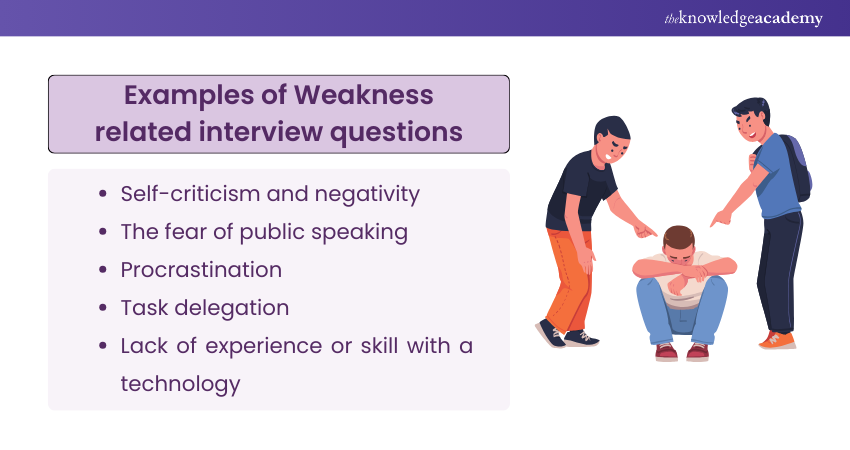We may not have the course you’re looking for. If you enquire or give us a call on +1 6474932992 and speak to our training experts, we may still be able to help with your training requirements.
Training Outcomes Within Your Budget!
We ensure quality, budget-alignment, and timely delivery by our expert instructors.

It's a common to be asked about your Strength and Weakness in an interview, and just like all other interview questions, your response to Strength and Weakness Interview Questions can be decisive in the outcome of said interview. Crafting your answers with professionalism and a great sense of self-awareness is necessary.
Although factors beyond your control may affect your selection rates, such as a strong economy causing an average acceptance rate to dip, understanding the Strength and Weakness Interview Questions can decide whether you make it within the selected few.
So, it’s time to familiarise yourself with these questions and stand out from the crowd. Read this blog to learn the top Strength and Weakness Interview Questions and crack every interview.
Table of Contents
1) Why do interviewers ask about Strength and Weakness?
2) Tips to answer Strength and Weakness Interview Questions
3) Strength and Weakness Interview Questions examples
4) Conclusion
Why do interviewers ask about Strength and Weakness?
Understanding the intent behind a seemingly challenging interview question is essential for responding effectively. The question on Strengths and Weaknesses serves the following purposes:
1) Assessing self-awareness:
Interviewers aim to gauge your level of self-awareness. Recognising your strengths and weaknesses is indicative of your ability to introspect. Employees who possess self-awareness are better positioned to leverage their strengths effectively and proactively work on areas that need improvement.
2) Evaluating willingness to improve:
Beyond identifying weaknesses, interviewers are keen to understand whether you actively pursue self-improvement. Acknowledging weaknesses is only valuable if accompanied by a commitment to address and overcome them.
3) Understanding work style:
Your response to questions provide insights into your work style and personality. How you navigate and articulate your weaknesses can unveil aspects such as stress management, teamwork, and adaptability. This understanding helps interviewers assess how well your work style aligns with the company culture and job requirements.
4) Job fitness evaluation:
The overarching goal of an interview is to determine if you are the right fit for the job. While your strengths validate your suitability, candidly acknowledging weaknesses demonstrates honesty and offers a glimpse into areas where you may need further development.
5) Assessing response to challenges:
Discussing weaknesses can be a stress-inducing aspect of an interview. Interviewers leverage this question to observe your composure under pressure. How you articulate your challenges and present plans for improvement reveals your ability to handle tough questions, showcasing resilience and adaptability in the face of challenges.
Tips to answer Strength and Weakness Interview Questions
One should follow a general set of rules while approaching an interview, especially regarding Strength and Weakness-based Questions. Some of such points are as follows:
Honesty
A genuine answer tends to sound more impressive than a generic one, as there are high chances the hiring manager or interviewer has heard some responses repeatedly. Stating how you are a perfectionist or punctual is likely to lose an interviewer's interest. To avoid this, express something you can genuinely abide by. Demonstrating that you can self-reflect is necessary during the Strength and Weakness Interview Questions.
Story
Any real-life or concrete example is a good idea to answer a Strength and Weakness Interview Question. It helps people contextualise the response in a better way. As people interviewing you understand concepts and circumstances much better with a story, a narrative that supports your positive traits and backing up your claims will always be helpful in such situations. It will bring out traits the interviewers might be looking for.
Insight
While defining your traits, you should be able to tie them to skills necessary for the role and company you're applying for. An answer is not complete until it addresses the relevance of your response to the interviewer.
So tell the interviewer why the traits you claim to have will be a positive addition to their company and how it is relevant to the job you are applying for.Having some insight in such situations can make your answers much more impressive.
Keep it concise
Always remember that you have a limited time frame to answer all the interview questions. An interviewer needs to be able to get all answers from you to give a proper assessment. Thus by dedicating too much of your time to strength and weakness-based questions, you might need more time for later ones. Try to narrow down your response accordingly.
Taking most of the interview time in responding to particular questions should be avoided at all costs. Quality responses over long-stretched answers that take half of the interview will always be favourable.
Don’t be anxious
Stressing over one poorly formed response is detrimental to effect overall results; an interview is the result of points taken from the collective responses for all Interview Question rather than just one.
Even if you could not respond appropriately to the previous question, it should not reflect upon the later one. It is doubtful for a decision to be boiled down to a single response rather than all. Salvage what you can to the best of your abilities without worrying about where you fell short.
Strategy
There is a certain approach for candidates to take when going for job-based interviews, such factors to keep in mind can drastically boost your chances of being selected, some of these factors and strategies are as follows:
a) Strength-based strategy:
Understand the interview from the hiring manager's viewpoint. Confidently articulate one or two top strengths relevant to the role, supported by experience. Align these strengths with job competency requirements, narrating examples to showcase practical application. Tailor responses to the job description, preparing statements seamlessly integrating your strengths into the interview.
b) Weakness-based strategy:
Acknowledge flaws while emphasising self-awareness and improvement measures. Pair weaknesses with countermeasures, portraying responsibility and initiative. Address relevant weaknesses, even outside stated requirements, demonstrating a commitment to acquiring necessary skills.
Avoid mentioning detrimental traits like delays or lack of precision; rather focus on constructive aspects. Be honest yet strategic, refraining from divulging details that could hinder your candidacy for the position.
Be relevant
Ensure your strengths align with the job by carefully reviewing the job description and company values. When discussing strengths during an interview, focus on those directly relevant to the position.
Further, tailor your response to showcase qualities identified in the job description, demonstrating a clear connection between your abilities and the role requirements. Authenticity is crucial, so only highlight the strengths you possess to align seamlessly with the company's needs and values.
Learn how to handle pressure from customers with our Handling Abusive Customers Training – sign up today!
Strength and Weakness Examples for a Job Interview
Here are some common examples of answering a question regarding your Strengths and Weaknesses in a job interview:

Here are some common examples of answering a question regarding your Strengths and Weaknesses in a job interview:
Some examples of strengths in a job interview
Here are some examples of how to present and narrate your answers to questions based on your strengths
1) Leadership qualities:
When answering questions about your leadership qualities, you can formulate an answer on the lines of“I have always considered my ability to collaborate and lead people my greatest asset. During my experience as a team leader, I successfully divided my team into two respective groups while keeping their respective skills in mind and allotted both of the teams their tasks in the same order. I ensured they were confident in their abilities, suited for their roles, and did their tasks well.
As a result, we successfully raised sales by 3% within our first month using the new task division. Not only do I find it easy to lead people and work with them, but I often know how to empathise with them, thus letting me communicate better with them appropriately it easy to lead people and work with them, but I often know how to empathise with them, thus letting me communicate better with them in an appropriate manner.”
Alternative words: you can also state that you can guide or have the ability to lead or be a captain if the need be.
2) Technical finesse and hard skills:
Here's an example to show your technical abilities: “I have always been fond of staying up to date with the latest tech trends. From my current position and role, I know the concepts and details of SEO quite well, and as a result, I can foresee problems before they arise. I have always been fascinated by tech, and I get excited while tinkering with my system and gadgets, even in my personal life. This trait has always been helpful to me in my work environment, especially when I get to know any software intimately."
Alternatively, it can be any complex skill depending on the job role. For administrative job roles, some common skills can be Data Entry, Scheduling, and Billing. Similarly, for a retail and sales-based job, skills like Product Knowledge, Lead Qualification as well as Customer Requirement Analysis (C.R.A) are a good set of skills to possess and mention, for IT Job roles you can mention your skills with programming languages, data structures, your experience with open-source material as well as web development.
3) Precision and attention to detail:
Example: “I love discovering new ways and methods to approach content creation, but I am well renowned for my attention to minor details. It is due to this habit I am very particular with things like word choice because I believe precise language can transform any mediocre content into something significantly greater, it is due to this habit I have never failed a deadline in past. My content has always done well with search results, consistently, reaching the top of searches.”
Alternatively, you can mention you are a process-oriented person, a system thinker, or have an efficient nature.
4) A positive attitude:
Example: "My positive attitude and approach to most situations are my core strengths, having worked as a front desk staff that requires high energy and endurance. I can view a situation from different perspectives and can hence have the ability to empathise with my clients better and understand what they demand of me at a given time."
Alternatively, you can state you have an upbeat personality, are forward-thinking, and don't lose motivation quickly.
5) Approach to problem solving
Example: “I consider myself a very solution-oriented person and a considerably fast learner. In my experience as a software developer, I learned to do my tasks well, even under severe pressure, when designing a product for our clients because my team would not be able to win a contract unless we produced a model quickly, with as short of a deadline as possible. Under these circumstances, I have not been scared to ask a few extra questions to figure out the possible challenges ahead. I have ensured I did extensive research for our clients to be well prepared."
Other examples of strength-related questions
Here’s a list of some other traits that can be presented and listed as strengths in an interview:
a) Flexibility
b) Determination
c) Dedication
d) Creativity
e) Empathy
f) Learning
Some examples of weakness-related interview questions
Here are some examples on how to present and narrate your answers for questions based upon your weaknesses:

Some examples of weakness-related interview questions
Here are some examples on how to present and narrate your answers for questions based upon your weaknesses
1) Self-criticism and negativity:
Example: "I often struggle with negative criticism and can become obsessed with avoiding a minor mistake if I receive supervision, focusing too much on perfecting my work, while I truly appreciate the guidance provided to me, as it helps me learn and be better, I can learn not to punish myself over minor errors, that everyone is bound to make."
Alternatively, you can state you can be too reflective at times.
2) The fear of public speaking:
Example: "I have often found public speaking very intimidating and have struggled with presentations due to that. As a result, I have decided to take countermeasures against it by enrolling in a public speaking course online, to be more confident in my abilities and learn to structure my speech better."
Alternatively, your weakness is that you often get overlooked by your peers or higher executives.
3) Procrastination:
Example: "Procrastination has been a bad habit for me for a long time. I believe that my fear of failure and, thus, rejection of my hard work may be the source of it. In my previous job as a content writer, keeping up with deadlines and necessary criteria demanded by the client was necessary for completing my task successfully. I started using calendar and time management-based apps like Evernote to manage my task and deadlines better than before. It directly affected my performance as crossing stuff from my task list made me feel accomplished and motivated, changing my approach to the harder tasks entirely."
4) Task delegation:
Example: "I have often struggled with delegating tasks and chose to take a larger workload instead myself to make sure the work was done on time and finished perfectly. This tends to put the majority of work pressure on me; hence I have started using software to assign different tasks and track their completion by keeping records of who was assigned which job and how much of the work was done. This has helped me understand my coworkers much better, and as a result, trust them better and focus on my tasks more."
Alternatively, you can mention that you are too demanding, controlling, or protective during certain occasions.
5) Lack of experience or skill with a technology:
Example: "I mainly used C++ throughout my experience in my previous position, so I don't have much experience in python. However, I did a course in python for a semester at my university. Still, I have not been able to use it ever since, as I have been mostly working with other languages and technologies."
Other examples of good weakness-related questions
Here’s a list of traits that can be presented and listed as weaknesses in an interview:
a) Impatience
b) Insecure
c) Too direct (being too blunt or straightforward at times)
d) Too detail-oriented (micro-managing too often).
e) Very introverted or extroverted
f) Disorganised
Join our Interview Skills Training and raise your chances of being placed!
Conclusion
Practice is a crucial step to make sure you succeed in answering Strength and Weakness Interview Questions. Everyone is bound to make mistakes and learn from them, but the margin of error can be reduced by taking countermeasures against it. But with the right amount of practice, you'll be able to impress the hiring manager when you are asked about your Strengths and Weaknesses and succeed in your future endeavours of securing a desired position.
Learn how to deal with your sentiments with the Sentiment Analysis Training – sign up today!
Frequently Asked Questions

Approach this question by acknowledging a genuine weakness but emphasising your efforts in overcoming it. Showcase self-awareness and highlight how you've turned challenges into opportunities for growth. Practice responses to convey sincerity and a commitment to improvement.

Positive weaknesses refer to traits that, when managed effectively, can become strengths. Examples include being overly detail-oriented, which ensures accuracy, or being too self-critical, driving continuous improvement. By framing them positively, candidates demonstrate self-awareness and an ability to leverage their characteristics for success.

The Knowledge Academy enhances global learning with a vast selection of over 30,000 online courses, accessible in more than 490 locations across 220 countries. This expansive reach ensures accessibility and convenience for learners worldwide.
Our diverse Online Course Catalogue covers 17 essential categories, complemented by a wealth of free educational Online Resources. These resources include up-to-date News, informative Blogs, tutorial videos, interactive webinars, and collections of Interview Questions. Furthermore, professionals looking for personalised education can take advantage of customisable Course Bundles, crafted to enrich and optimise the learning journey.

The Knowledge Academy's Knowledge Pass, a flexible prepaid voucher system, offers the freedom to enrol in courses over a 12-month period. Start your limitless learning adventure with us and embrace education that knows no bounds.

Discover an array of Personal Development Courses at The Knowledge Academy, featuring specialised Organisational Skills, Emotional Intelligence Training, Time Management Training, etc. Designed for different skill levels, our courses provide the necessary technical expertise to meet Emotional Resilience.
Whether you're starting out or looking to upgrade your skills, immerse yourself in our Business Skills Blogs for further understanding and expertise. Embark on a journey with us to elevate your Personal Development Skills!
Upcoming Business Skills Resources Batches & Dates
Date
 Interview Skills Training
Interview Skills Training
Fri 10th Jan 2025
Fri 14th Feb 2025
Fri 11th Apr 2025
Fri 23rd May 2025
Fri 8th Aug 2025
Fri 26th Sep 2025
Fri 21st Nov 2025







 Top Rated Course
Top Rated Course



 If you wish to make any changes to your course, please
If you wish to make any changes to your course, please


